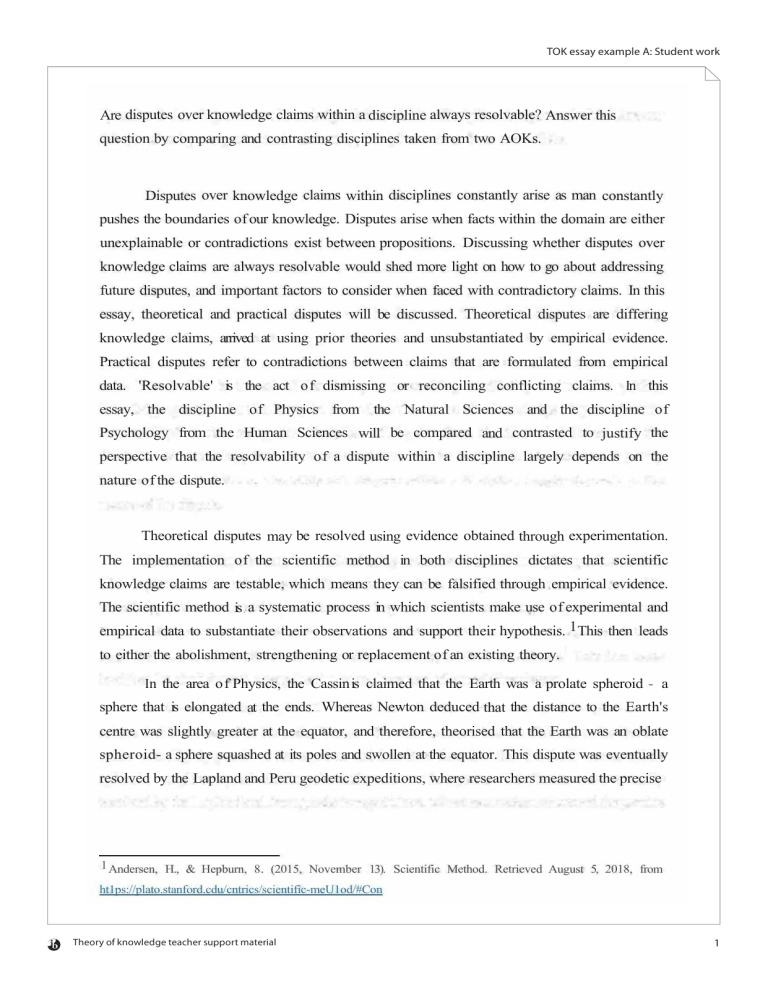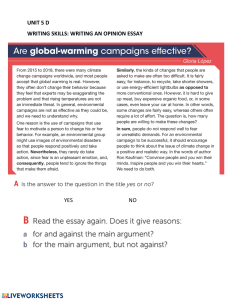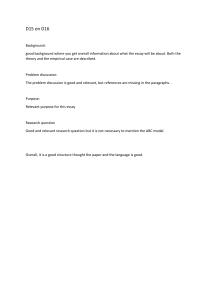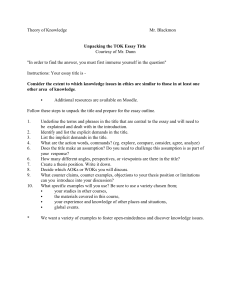
TOK essay example A: Student work Are disputes over knowledge claims within a discipline always resolvable? Answer this question by comparing and contrasting disciplines taken from two AOKs. Disputes over knowledge claims within disciplines constantly arise as man constantly pushes the boundaries of our knowledge. Disputes arise when facts within the domain are either unexplainable or contradictions exist between propositions. Discussing whether disputes over knowledge claims are always resolvable would shed more light on how to go about addressing future disputes, and important factors to consider when faced with contradictory claims. In this essay, theoretical and practical disputes will be discussed. Theoretical disputes are differing knowledge claims, arrived at using prior theories and unsubstantiated by empirical evidence. Practical disputes refer to contradictions between claims that are formulated from empirical data. 'Resolvable' is the act of dismissing or reconciling conflicting claims. In this essay, the discipline of Physics from the Natural Sciences and the discipline of Psychology from the Human Sciences will be compared and contrasted to justify the perspective that the resolvability of a dispute within a discipline largely depends on the nature of the dispute. Theoretical disputes may be resolved using evidence obtained through experimentation. The implementation of the scientific method in both disciplines dictates that scientific knowledge claims are testable, which means they can be falsified through empirical evidence. The scientific method is a systematic process in which scientists make use of experimental and empirical data to substantiate their observations and support their hypothesis. 1 This then leads to either the abolishment, strengthening or replacement of an existing theory. In the area of Physics, the Cassin is claimed that the Earth was a prolate spheroid - a sphere that is elongated at the ends. Whereas Newton deduced that the distance to the Earth's centre was slightly greater at the equator, and therefore, theorised that the Earth was an oblate spheroid- a sphere squashed at its poles and swollen at the equator. This dispute was eventually resolved by the Lapland and Peru geodetic expeditions, where researchers measured the precise 1 Andersen, H., & Hepburn, 8. (2015, November 13). Scientific Method. Retrieved August 5, 2018, from ht1ps://plato.stanford.cdu/cntrics/scientific-meU1od/#Con Theory of knowledge teacher support material Page I of7 1 TOK essay example A: Student work Theory of knowledge teacher support material 2 TOK essay example A: Student work Theory of knowledge teacher support material 3 TOK essay example A: Student work Theory of knowledge teacher support material 4 TOK essay example A: Student work Theory of knowledge teacher support material 5 TOK essay example A: Student work Theory of knowledge teacher support material 6 TOK essay example A: Student work Theory of knowledge teacher support material 7




